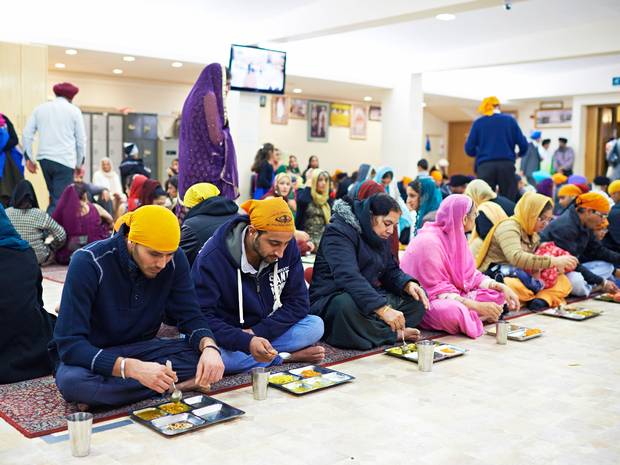Sikh temples in the UK have noticed an increase of non-sikhs and low income people at mealtime.
UK down-on-luck citizens don’t need to be Sikhs to eat here, they just need to believe in peace.
Sikhism dictates a strict vegetarian diet so the food often served in gurdwaras usually includes lentils, roti Indian bread, vegetables, yoghurt and Indian sweets. The rising number of non-Sikhs sitting down together alongside the religious observers to for a midday meal indicates that no one seems to mind. Religious leaders in the Sikh communities across the UK are reporting an increase of visitors during mealtimes. More and more non-believers are visiting gurdwara temples, knowing they won’t be turned away from a free hot meal.
The effects of the UK’s slumping economy and austerity measures are making it harder for debt-ridden overseas students to make ends meet, and more difficult for the homeless to get back on their feet. Others, especially women with children, whose low-paying jobs can barely afford rising rent costs, let alone lunchtime, are coming to the temples in droves for a free meal, and a respite from their troubles.
Harmander Singh, a spokesman for the Sikhs In England think-tank, said: “It’s noticeable: more people coming in and more people coming frequently.” While Sikhs will welcome anyone into the gurdwara as long as they are not drunk, they remove their shoes and cover their head, but he also cautions, “It’s not a free buffet, it’s a way of serving the community.”
The Sikh Federation UK estimates 5,000 meals a week are now served to non-Sikhs through Britain’s 250 gurdwaras; food that is made 24/7 by volunteers and funded by donations. While foodbanks fed an estimated 346,992 people across, Sikh temples can’t support so many people, but their assistance in easing the strain on public foodbanks is welcome.
Especially in in light of welfare reforms, good samaritans like Amrick Singh Ubhi of the Nishkam Centre in Birmingham, vice-chair of the Council of Sikh Gurdwaras, works with local community groups to do outreach towards people afraid to visit a place of worship for help.
He reminds more apprehensive Sikhs as well that, “we have to realise that while we see our respective places of worship as a sanctuary, not all people will. We see that people of other faiths and none do mix, but there is always that apprehension of “the other” and until we break down those barriers and start working together that will remain so.”
Among the 6,000 visitors a week eating lunch at the Karamsar Gurdwara was a group of overseas medical students. One student, and Indian Catholic, explained that, “for the last 10 days we have come here regularly. They have a welcoming attitude. People don’t discriminate. I was surprised to see a mini Punjab here.”
A Chinese student reported to finding the gurdwara a very welcoming and peaceful place. “They are taking care of me. I like the variety of the food. I haven’t seen this before I came to England. People seem to be very nice.”
World hunger isn’t about to be eradicated overnight, but the generosity of others, an open door, a hot meal and a welcoming environment are one way of helping the cause along. As one student put it, “the food is like home-cooked,” and home, as we well know, is where the heart is.
Featured Image: http://www.independent.co.uk
Anokhi Blogs, Anokhi Media, Banks, Birmingham, Community, Cooked, Funded, Independent, Lifeline, Mealtimes, Medical, Midday, Peace, Public, Sikh, Spokesman, Strict, Student, Temple, Uk, Variety, Vegetables, Vegetarian, Visitors, Volunteers, Working
COMMENTS
YOU MAY ALSO LIKE
-

Picnic Like A Pro: Easy South Asian BBQ Recipes To Wow Everyone
-

This Might Get Heated: The Ultimate Chai Ranking No One Asked For
-

The Ultimate Mother’s Day Gift Guide For Your Desi Mom
-

Ever Hosted A Desi Picnic? Here Is Your Ultimate Guide To Wowing Your Family & Friends
-

'Detective Aunty' & 9 Other Must-Read Spring 2025 Books By South Asian Authors
-

Beyond Samosas: Healthy & Satisfying Ramadan Suhoor And Iftar Recipes!
-

6 Ways South Asian Parents Can Teach Their Children About Black History Month
-

Rose Barfi, Chocolate Naan Khatai & More: South Asian Dessert Recipes For Valentine's Day
-

From Birth Charts To Lunar Calendars: Setting Intentions For 2025 With South Asian Traditions
-

How To Host The Perfect South Asian Holiday Dinner
-

ANOKHI's Holiday Gift Guide For Thoughtful Desi Presents For The Home & Beyond
-

Not Into Flu Shots? Try These Centuries-Old Desi Home Remedies Instead!
-

Diwali Gift Guide: Barbie® Diwali Doll & 8 More Unique South Asian Gift Ideas
-

From Turkey To Tadka: Desi-Inspired Thanksgiving Recipes
-

Mommy's Time-Out: How To Reclaim Your Zen After The Back-to-School Scramble
-

Khichdi Cups & 5 South Asian School Lunch Recipes For Busy Desi Parents
-

6 Complaints Desi Grandparents Have About Keeping Pets & How You Can Counter Them
-

Raksha Bandhan Gift Guide: Celebrate The Festival With A Modern Twist!
-

Summer Elixirs: Healthy South Asian Cooling Drink Recipes To Beat The Heat
-

Stay Cool: Build a Summer Garden Oasis At Home With Tulsi & Shade
-

Celebrating International Yoga Day: Find Your Balance Through Chakra Meditation
-

Spice Up Your Summer BBQ With These 5 Mouthwatering South Asian Recipes
-

South Asian Heritage Month: Journey Through Time With 8 Iconic South Asian Travel Destinations
-

How To Add Ancient South Asian Spiritual Cleansing Rituals To Modern Spring Cleaning Techniques
-

Toronto's Living Luxe Design Show Sets a New Standard for Luxury Exhibitions
-

Savouring South Asian Style: Elevate Your Home Decor with Cultural Flair
-

6 Ways To Create Fun Quality Time With Your Kids & Parents That Both Will Love!
-

Celebrating South Asian Literature: Must-Read Books by Female Authors
-

Flavourful Festivities: Traditional Holi Recipes To Spice Up Your Table
-

The Living Luxe Design Show Presented By JennAir Announces Powerhouse Program Of Speakers
-

7 Ways Yoga Will Save Your Mental Health
-

Ask Dr. Monica Vermani: How Can I Convince My Friend That Her Threatening Boyfriend Is The Problem, Not Me?
-

10 Tips To Manage & Survive Long-Distance Relationships
-

Ask Dr. Monica Vermani: I'm Afraid My Childhood Bully Will Be Back In My Life, What Do I Do?
-

Ask Dr. Monica Vermani: How Do I Create "Me Time" In My Demanding Life?
-

Hot Spot Alert: Mishree Cocktails & Cuisine Exhilarates With South Asian X Middle Eastern Cuisine
-

BioAro Founder Dr. Anmol Kapoor Wants You To Be The CEO Of Your Health
-

Savour the Holidays With This Paneer Pakora Recipe By KFI Sauces!
-

Here's How To Craft And Achieve Meaningful New Year's Resolutions
-

Snack It Up This Holiday Season with Indian-Inspired Potato Wedges by KFI Sauces
-

Butter Chicken Nachos Recipe By KFI Sauces Is Perfect For Your Holiday Spread
-

Ask Dr. Monica Vermani: How Do I Tell My Friend She's Taking My Emotional Support For Granted?
-

Anjali Pathak of Patak's Shares Her Favourite Recipes For The Holiday Season
-

Ask Dr. Monica Vermani: Why Does Our Family Get Togethers Always End With A Fight?
-

Ask Dr. Monica Vermani: How Do I Tell My Sis-In-Law To Stop Intruding In My Daughter's Wedding Plans?
-

Event Alert: The Auric Living Conference Brings Holistic Healing To Toronto
-

Ask Dr. Monica Vermani: I'm On The Outs With My Friend Because I Supported Her Breakup What Do I Do?
-

Event Alert: The Desai Foundation Rings In 10th Anniversary of "Diwali On The Hudson" Gala
-

South Asians & Arthritis: Busting Myths And Sharing Facts About This Disease In Our Community
-

Ask Dr. Monica Vermani: How Do I Convince My Kids That My Granddaughter's Best Friend Is A Bully?
-

Make Your Brunch Brilliant With This French Buckwheat Crepes & Dosas Recipe!
-

Ask Dr. Monica Vermani: How Do I Tell My Sis-In-Law That Her Messy Dog Is Not Welcome At My House?
-

You Just Need A Hot Pot To Make This Amazing Masala Style Vegan Tomato Soup
-

Ask Dr. Monica Vermani: How Do I Tell My Friend To Stop Interrupting Me?
-

Ask Dr. Monica Vermani: How Do I Trust My Husband After He Cheated On Me?
-

Check Out This Insane Recipe For Mini Masala Idli
-

Ask Dr. Monica Vermani: How Do I Tell My Brother That His Cottage Rules Ruins All The Fun?
-

Ask Dr. Monica Vermani: What Do I Do When My Fiancé Shares His Dog With His Ex?
-

Ask Dr. Monica Vermani: How Do I Convince My Partner That Our Six-Year-Old Is To Young For Sleepovers?
-

Ask Dr. Monica Vermani: How Do I Deal With My Friend Who Always Wants To Start A Fight?


















































